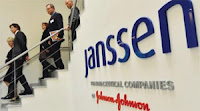martes, 23 de agosto de 2016
Esketamina: J&J therapy for suicidal depressives 'a breakthrough', says FDA
A Johnson & Johnson (J&J) drug that aims to prevent people with serious depression committing suicide has been awarded breakthrough status by the US regulator.
The FDA has granted the status to an intranasal formulation of esketamine on the back of the phase II PeRSERVERe trial, which showed the drug was able to reduce suicidal ideation scores in at-risk major depressive disorder (MDD) patients.
Breakthrough status
The status sets up an expedited review process at the FDA as well as a higher level of interaction with the agency.
There is a critical need for drugs that can interrupt the thought processes that can lead to suicide in patients with severe depression, particularly as most currently-used antidepressants can take weeks to have an effect.
Ver:Cyclurad:
Descubren píldora anti-suicidio en Israel...y en Oviedo Esketamina.
Currently the only approved fast-acting treatments for MDD are transcranial magnetic stimulation and electro-conductive therapy.
Esketamine works as a glutamate NMDA antagonist, a different mechanism to current antidepressant drug classes, and has been shown to lift the mood of patients within a few hours in some cases. It has already been granted breakthrough status for treatment-resistant depression and is currently in a phase III programme with a filing expected in 2017.
"In the US alone, there are more than 41,000 suicides each year, many of which result from untreated or poorly treated major depression," said Husseini Manji, who heads up neuroscience drug development at J&J's pharma unit Janssen.
"This designation reinforces the potential of esketamine as a novel treatment for patients with MDD who are at imminent risk for suicide, a condition for which there is currently no approved treatment and which represents a major public health challenge."
Ver:
FDA grants breakthrough therapy designation for depression drug
The suicide rate in MDD patients is approximately 20 times higher than in the general population, and the number of suicide deaths is rising in the US, according to an April 2016 report from the Centers for Disease Control and Prevention (CDC).
The suicide rate jumped by 24% between 1999 and 2014, rising from 10.5 to 13 per 100,000 people, according to the CDC figures.
Esketamine is a derivative of ketamine - arguably better known as a party drug but which has been used at high doses as an anaesthetic for decades - and is around twice as potent as its parent drug.
Other pharmaceutical companies are developing antidepressants with ketamine-like properties and activity against NMDA receptors.
Allergan has an intravenously-administered candidate called rapastinel entering phase III trials as an adjunctive treatment for MDD and picked up a breakthrough designation from the FDA in January. It acquired the drug as part of its $560m takeover of Naurex Pharma last year, along with an orally-active follow-up (apimostinel) in earlier clinical development.
Meanwhile, Cerecor has an orally-active NMDA antagonist called CRC-301 in phase II trials for treatment-resistant MDD while another oral candidate from VistaGen is at a similar stage of development. Turing Pharmaceuticals has also filed for approval to start trials of an intranasal ketamine formulation, specifically targeting suicidal behaviour. (Ver)
Etiquetas:
Agrupaciones,
FDA,
I+D,
Investigación,
J_J,
Mercados,
Producto,
USA
Suscribirse a:
Enviar comentarios (Atom)













No hay comentarios:
Publicar un comentario